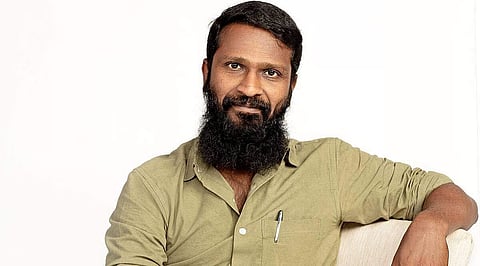

Tamil film director Vetri Maaran's works masterfully incorporate social narratives in soulful and rooted storylines. What packs a punch to his gripping screenplay are the dialogues that aptly capture the mood of a particular scene or a character. As the director turns 50 today, let's take a look at some of the seminal lines from his movies.
'Naa Sappa Dhaane' (Polladhavan - 2008)
How often have we seen a hero in Tamil cinema mouthing self-effacing words in a confrontation scene? Vetri did it in his directorial debut, Polladhavan, with an extraordinary Dhanush, who was then up and coming. This particular sequence transitions from an emotionally-charged scene to a mass scene, where Prabhu (Dhanush), who has just turned into a responsible son, faces a double-whammy situation of losing his bike and his father getting physically assaulted by the gang that he suspected of having stolen his bike. Prabhu is both weak and enraged at the actions of the gang, led by a reasonable Selva (Kishore), whose loose cannon younger brother Ravi (Daniel Balaji) is giving him and Prabhu a hard time. Prabhu's bike is not just a vehicle, but an angel that has given him a fresh lease of life. Losing his pulsar and almost losing his father, Prabhu's pent-up rage shows up, but, realising he is the sole breadwinner of the family, he shows restraint. The scene captures the range of emotions that Prabhu is experiencing with the lines starting from "Naa Sappa Dhaane, Nee Enna Kuththi Potta Yaar Keppanga" to "Podra....... Podra".
'En Seva Pandhayam Adikkum' (Aadukalam - 2011)
Vetri Maaran's sophomore and second collaboration with Dhanush is far removed from the urban hustle and bustle as Aadukalam shifts to Madurai's reputed and peculiar Rooster Clash. The film, which is full of grey characters with no clear good or bad people, solely relies on human impulses and ego to create drama and drive their motives. In a marked departure from most interval scenes in Tamil cinema that have an action sequence for the male lead, Aadukalam places a rooster that belongs to Dhanush's Karuppu. The rooster plays a crucial role in separating Karuppu from his mentor Pettaikaaran (VIS Jayapalan) forever that the latter begins seeing the former as his sworn enemy. This scene creates a rift between them and riles Pettaikaaran one word at a time. Karuppu says multiple times that "En Seva Pandhayam Adikkum". And every time he says that, Pettaikaaran's ego gets bruised and he feels slighted. Karuppu, who till then was a docile sidekick of Pettaikaaran, for the first time, acted without anyone's agency. The lines spoken by Karuppu and the responses defined the moment and acted as an omen for the things to come.
"Sanda Seiyanum" (Vada Chennai - 2018)
It is really hard to pick one strong line from the film that has plenty of them. Dhanush's Anbu, who was anxious about his and his family's safety, revolts against the hypocritical Guna (Samuthirakani). Recollection of Rajan's past and the reassuring pat Anbu gets from his wife Padma (Aishwarya Rajesh), gives him a renewed strength to take on Guna, who is tempted to compromise Anbu in the jail assault on Senthil (Kishore). Anbu declares he is a changed man who will not cower to the might of the gangsters of his locale in a powerful monologue to Chandra (Andrea) that begins with "Oruthan Seththa Mudiyura Sandayakka Idhu?". Anbu emphatically says that he will stand his ground, as fleeing will only bring more oppression, and it will get unbearable after a point. Anbu has his plans clear as he ends with, "Naama Jeikkurumo Illayo, Aana Sanda Seiyanum."
'Padippa Yaarum Unkitterundhu Eduthikida Mudiyaathu' (Asuran - 2019)
Dhanush's Sivasami, after all the bloodshed, is finally able to have an objective and a civil conversation with Chidambaram (Ken Karunaas), before he walks into the prison for the well-being of the remainder of his family. This line sums up the intention of the film and also effectively unpacks why some people of the oppressor caste always want the people of the oppressed caste to stay on pins and needles. Sivasami, while telling Chidambaram to be a good son to his mother and study well, also urges him not to do the unjust that is being done to him. When Sivasami says, "Unkitta Kaadu Irundha Edukiduvanunga, Roova Irundha Pudungikiduvanunga, Aana Padippa Yaarum Unkitterundhu Eduthikida Mudiyaathu," he not just illustrates the importance of education but also states a historical truth that once a human settles and is not in a state of perturbedness, he/she will naturally look to go next level and do things to live a better life. More than ego and vengeance, the Sivasami-Vadukkooran clash is rooted in the latter's 'fear' of what if Sivasami comes on par with him. The prospect of equality is what gives Vadakooran the delirium of paranoia and makes Sivasami's family flee and make them struggle even for the basic needs, such as a safe and peaceful life. The final line - "Orey Oorla Dhaan Irukkom, Orey Baasa Dhaan Pesrom. Idhu Podhadha Nammala Onnu Sekka" - uttered by Sivasami unambiguously ends the cycle of revenge and bloodthirst with Chidambaram.
"Perumal Mela Thappa Illa Adha Padikkura Pasanga Mela Thappa" (Viduthalai - 2023)
Vetri Maaran makes a pertinent point about people raising questions against the system, not by the protagonist, but by the antagonist. In a scene where the cops discuss the teacher-turned-brigand Perumal Vaathiyar (Vijay Sethupathi), DSP Sunil Menon (Gautham Vasudev Menon) states that it is the system that is wrong, and it is the reason why people like Perumal emerge. The line - "10 Thalamura Kalichu Oruthanukku Ivan Ippo Ezhudhuradhu Sarinu Patta, Adhuvaraikkum Andha Thappa Indha System Sari Pannalanu Dhaane Artham. Adhu Perumal Maadhri Aalunga Mela Thappa Illa Adha Padikkura Pasanga Mela Thappa," cuts to the core and conveys the fundamental message of the two-part film that if a system doesn't treat an issue, then it is bound to dig its own grave as it makes the ground fertile for non-state actors like Perumal.